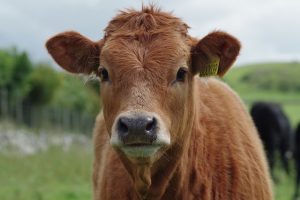Health officials in Larimer County, CO have confirmed rabies in a steer, prompting a reminder for pet and livestock owners to keep their animals up-to-date on rabies vaccinations to prevent lengthy and costly quarantines—or even euthanasia—if they have an encounter with a rabid animal.

This marks the first transmission of rabies to a mammal other than a skunk in 2019. So far 26 skunks have been confirmed positive with rabies in Larimer County this year.
In Larimer County, positive rabies is most normally found in skunks and bats but does occasionally cross into other species. So far this year Larimer County has the highest confirmed rabies infection in animals across the state of Colorado. Skunk rabies may pose a greater risk to pets and livestock because—as ground-based animals—they may interact more with animals than bats.
Rabies is spread primarily by saliva through the bite of a rabid animal. Once symptoms of rabies infection appear, there is no cure and the infection is fatal. People that have been exposed to rabies can receive medication treatment to prevent illness.
Health officials offer the following advice for residents:
- Do not feed or touch wildlife.
- Teach children to observe wildlife from a distance and to notify an adult if there is a wild animal in the area or if they are bitten or scratched.
- Eliminate food sources for wild animals by not feeding pets outdoors, closing pet doors especially at night, and tightly closing garbage cans and feed bins.
- Ensure that your pets, horses and livestock are up-to-date on their rabies vaccinations.
- Candida auris reported in Southern California healthcare facilities
- African swine fever in Asia: 1.1 million pigs culled
- Plague in Mongolia: Quarantine lifted; Is foodborne transmission possible?
- Zoonotic diseases in the US: Rabies, Lyme disease among eight of most concern
- California: Raw oysters linked to GI illnesses
- Brazil: 1st human rabies case reported in Santa Catarina in nearly 40 years
- Indiana University mumps tally rises to 31



One thought on “Colorado: Rabies in a Larimer County steer”